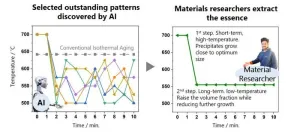(Press-News.org) Health care organizations are looking to artificial intelligence (AI) tools to improve patient care, but their translation into clinical settings has been inconsistent, in part because evaluating AI in health care remains challenging. In a new article, researchers propose a framework for using AI that includes practical guidance for applying values and that incorporates not just the tool’s properties but the systems surrounding its use.
The article was written by researchers at Carnegie Mellon University, The Hospital for Sick Children, the Dalla Lana School of Public Health, Columbia University, and the University of Toronto. It is published in Patterns.
“Regulatory guidelines and institutional approaches have focused narrowly on the performance of AI tools, neglecting knowledge, practices, and procedures necessary to integrate the model within the larger social systems of medical practice,” explains Alex John London, K&L Gates Professor of Ethics and Computational Technologies at Carnegie Mellon, who coauthored the article. “Tools are not neutral—they reflect our values—so how they work reflects the people, processes, and environments in which they are put to work.”
London is also Director of Carnegie Mellon’s Center for Ethics and Policy and Chief Ethicist at Carnegie Mellon’s Block Center for Technology and Society as well as a faculty member in CMU’s Department of Philosophy.
London and his coauthors advocate for a conceptual shift in which AI tools are viewed as parts of a larger “intervention ensemble,” a set of knowledge, practices, and procedures that are necessary to deliver care to patients. In previous work with other colleagues, London has applied this concept to pharmaceuticals and to autonomous vehicles. The approach treats AI tools as “sociotechnical systems,” and the authors’ proposed framework seeks to advance the responsible integration of AI systems into health care.
Previous work in this area has been largely descriptive, explaining how AI systems interact with human systems. The framework proposed by London and his colleagues is proactive, providing guidance to designers, funders, and users about how to ensure that AI systems can be integrated into workflows with the greatest potential to help patients. Their approach can also be used for regulation and institutional insights, as well as for appraising, evaluating, and using AI tools responsibly and ethically. To illustrate their framework, the authors apply it to the development of AI systems developed for diagnosing more than mild diabetic retinopathy.
“Only a small majority of models evaluated through clinical trials have shown a net benefit,” says Melissa McCradden, a Bioethicist at the Hospital for Sick Children and Assistant Professor of Clinical and Public Health at the Dalla Lana School of Public Health, who coauthored the article. “We hope our proposed framework lends precision to evaluation and interests regulatory bodies exploring the kinds of evidence needed to support the oversight of AI systems.”
END
New framework for using AI in health care considers medical knowledge, practices, procedures, values
2023-11-27
ELSE PRESS RELEASES FROM THIS DATE:
Increasing high-temperature strength of materials through collaborative efforts of AI and materials researchers
2023-11-27
1. A materials research team consisting of NIMS and Nagoya University has designed a novel two-step thermal aging schedule (i.e., non-isothermal aging or unconventional heat treatment) capable of fabricating nickel-aluminum (Ni-Al) alloys that are stronger at high temperatures than Ni-Al alloys fabricated using conventional thermal aging processes. This was achieved by using artificial intelligence (AI) techniques to identify several dozen different thermal aging schedules potentially effective in increasing alloys’ high-temperature strength. The mechanisms ...
The jigglings and wigglings of atoms reveal key aspects of COVID-19 virulence evolution
2023-11-27
Auburn, AL – Richard Feynman famously stated, “Everything that living things do can be understood in terms of the jigglings and wigglings of atoms.” This week, Nature Nanotechnology features a groundbreaking study that sheds new light on the evolution of the coronavirus and its variants of concern by analyzing the behavior of atoms in the proteins at the interface between the virus and humans. The paper, titled “Single-molecule force stability of the SARS-CoV-2–ACE2 interface in variants-of-concern,” is the result of an international collaborative ...
UCF receives 3 minority serving institution awards to promote collaborations with NASA
2023-11-27
ORLANDO, Nov. 27, 2023 – Three research projects from the University of Central Florida have been selected for NASA Minority University Research and Education Project Partnership Annual Notification (MPLAN) awards. The grants, worth up to $50,000 each, are designed to connect and promote research collaborations between Minority Serving Institutions and NASA Mission Directorates.
A total of 18 projects received Phase I funding across 15 universities. UCF received the most awards, with all three housed within the College of Engineering and Computer Science. Dean Michael Georgiopoulos ...
Stem cell-based treatment controls blood sugar in people with Type 1 diabetes
2023-11-27
An innovative stem cell-based treatment for Type 1 diabetes can meaningfully regulate blood glucose levels and reduce dependence on daily insulin injections, according to new clinical trial results from the University of British Columbia (UBC) and Vancouver Coastal Health (VCH).
“This is a significant step toward a functional cure for Type 1 diabetes,” said Dr. David Thompson, principal investigator at the Vancouver trial site, clinical professor of endocrinology at UBC and director of the Vancouver General Hospital Diabetes Centre. ...
Wave Devouring Propulsion: a revolutionary green technology for maritime sustainability
2023-11-27
A new form of wave devouring propulsion (WDP) could power ships and help to cut greenhouse gas emissions in the maritime industry.
Academics from Cranfield University have worked on the concept of using wave energy for propulsion, and designed an inventive method of achieving greater thrust from the power of the waves by harnessing a vessel’s submerged flapping foils in an innovative way.
Inspiration from whale fins
Taking inspiration from the power of a whale's fins, the team studied the structure and movement of the tail fin to unravel how it effectively uses wave energy for propulsion. Through simulations and experiments, they developed ...
Algorithmic recommendation technology or human curation? Study of online news outlet in Germany suggests both
2023-11-27
Recommender systems are machine learning applications in online platforms that automate tasks historically done by people. In the news industry, recommender algorithms can assume the tasks of editors who select which news stories people see online, with the goal of increasing the number of clicks by users, but few studies have examined how the two compare.
A new study examined how users of an online news outlet in Germany reacted to automated recommendations versus choices made by human editors. On average, the algorithm outperformed the person, but the person did better under certain conditions. The study’s authors suggest a combination of human curation and automated recommender ...
BU study finds breast density discussions with clinicians varied significantly by race/ethnicity and literacy level
2023-11-27
(Boston)—Breast density information aims to increase awareness of breast density and its risks and inform future breast screening decisions. Breast density notifications (BDN) advise women to discuss breast density with their clinicians, but prior research shows less than half of women in the general population have those conversations and little is known about the content of conversations that do occur.
A new study by researchers from Boston University Chobanian & Avedisian School ...
Alien haze, cooked in a lab, clears view to distant water worlds
2023-11-27
Scientists have simulated conditions that allow hazy skies to form in water-rich exoplanets, a crucial step in determining how haziness muddles observations by ground and space telescopes.
The research offers new tools to study the atmospheric chemistry of exoplanets and will help scientists model how water exoplanets form and evolve, findings that could help in the search for life beyond our solar system.
“The big picture is whether there is life outside the solar system, but trying to answer that kind of question requires really detailed modeling of all different types, specifically in planets with lots of water,” said co-author ...
Deoxygenation levels similar to today’s played a major role in marine extinctions during major past climate change event
2023-11-27
Scientists have made a surprising discovery that sheds new light on the role that oceanic deoxygenation (anoxia) played in one of the most devastating extinction events in Earth’s history. Their finding has implications for current day ecosystems – and serves as a warning that marine environments are likely more fragile than apparent.
New research, published today in leading international journal Nature Geosciences, suggests that oceanic anoxia played an important role in ecosystem disruption and extinctions in marine environments during the Triassic–Jurassic mass extinction, ...
Fish IgM structure sheds light on antibody evolution, study finds
2023-11-27
Antibodies—proteins that are produced by our immune system to protect us—are crucial for recognizing and getting rid of unwanted substances, or antigens, in our body. Although their role is universal, antibody structure varies in different animals. In a new study, researchers have analyzed the antibody Immunoglobulin M in rainbow trout to shed some light on why these proteins may have evolved over time.
In humans, IgM consists of five repeating units that are held together by a joining chain, resulting in a star shape. Consequently, IgM can bind to multiple antigens at the ...





